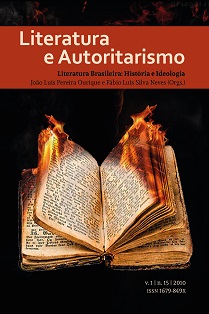Theater and society: An approach to Liberdade, liberdade, by Millôr Fernandes and Flávio Rangel
DOI:
https://doi.org/10.5902/1679849X73879Keywords:
Contemporary Brazilian theater, Theater of resistance, Millôr Fernandes, Flávio RangelAbstract
Anchored in contributions by Schiller (1991); Magaldi (1997, 2008); Pavis (2005); Pallottini (2006) and Heliodora (2008), with regard to the constitution of theatrical discourse, by Cotrim (2002); Olivieri (2009) and Santana (2009) regarding the military dictatorship and censorship, and the theoretical assumptions of Pesavento (1998); Esteves (1998) and White (1994) for the approach of the relations that are established between Literature and History, this article will analyze the importance of Literature in the formation of national identity, as well as the possibilities of using History with the purpose of awakening the conscience of readers. In the 1960s and 1970s, Brazilians experienced censorship in the theater during successive military governments. The play Liberdade, Liberdade (1965), by Millôr Fernandes and Flávio Rangel is among the pioneering works of political resistance theater, as it denounced the repressive scheme that dominated the country. To carry out this work, the basic procedure was a bibliographical research. The work ranges from the dramatic to the comic, supported by political discourse. Through the work Liberdade, Liberdade it is possible to reflect on the themes that stood out in the sixties and seventies, such as military power, the nation's nonconformity and the relentless pursuit of freedom of expression.
Downloads
References
BUENO, Rodrigoh. Liberdade, liberdade: um marco na dramaturgia brasileira. Jornal de teatro. Disponível em: <http://www.jornaldeteatro.com.br/materias/reportagem/13-liberdadedramturgia.html> Acesso em: 09 jul. 2009.
CORTEN, André. Discurso e representação do político. In: INDURSKY, Freda e FERREIRA, Maria C. Leandro (Orgs.). Os múltiplos territórios da análise do discurso. Porto Alegre: Sagra Luzzatto, 1999, p. 37-52. (Ensaios 12)
COTRIM, Gilberto. Saber e fazer história. 3. ed. São Paulo: Saraiva, 2002.
ENCICLOPÉDIA ITAÚ CULTURAL DE TEATRO. Liberdade, liberdade.
Disponível em: <http://www.itaucultural.org.br/aplicexternas/enciclopedia_teatro/index.cfm?fuseaction=espetaculos_biografia&cd_verbete=447&lst_palavras=&cd_idioma=28555>. Acesso em: 31 mar. 2009
ENCICLOPÉDIA ITAÚ CULTURAL DE TEATRO. Teatro de resistência.
Disponível em: <http://www.itaucultural.org.br/aplicExternas/enciclopedia_teatro/index.cfm?fuseaction =conceitos_biografia&cd_verbete=613>. Acesso em: 27 jul. 2009.
ESTEVES, Antônio R. O novo romance histórico brasileiro. In: ANTUNES, Letizia Zini (Org.). Estudos de literatura e linguística. São Paulo: Arte & Ciência, 1998.
FERNANDES, Millôr; RANGEL, Flávio. Liberdade, liberdade. Porto Alegre: L&PM, 2006.
FREITAS, Maria Teresa de. Romance e história. Uniletras, 11, n.11, Ponta Grossa, 1989, p. 109-118.
FREITAS, Ludmila Sá de; RAMOS, Rosangela Patriota Ramos. Calabar: o tema da traição no teatro da resistência democrática e o debate historiográfico. Revista Horizonte Científico, Uberlândia, n. 4, p. 1-26, 2005. Disponível em: <http://www.propp.ufu.br /revistaeletronica/>. Acesso em: 09 jul. 2009.
HELIODORA, Barbara. O teatro explicado aos meus filhos. Rio de Janeiro: Agir, 2008
MAGALDI, Sábato. Panorama do teatro brasileiro. 3 ed. rev. e ampl. São Paulo: Global Editora, 1997.
MAGALDI, Sábato. Iniciação ao teatro. 7. ed. São Paulo: Ática, 2008.
NEW YORK TIMES. O New York Times comenta Liberdade, liberdade. In: FERNANDES, Millôr & RANGEL, Flávio. Liberdade, liberdade. Porto Alegre: L&PM, 2006. p. 9-11.
OLIVIERI, Antonio Carlos. O regime militar e a liberdade de expressão. Disponível em: <http://educacao.uol.com.br/historia-brasil/censura-ditaduramilitar.jhtm>. Acesso em 27 jul. 2009.
PAES, Maria Helena Simões. A década de 60: rebeldia, contestação e repressão política. 4. ed. São Paulo: Ática, 2004.
PALLOTTINI, Renata. O que é dramaturgia. São Paulo: Brasiliense, 2006.
PAVIS, Patrice. Dicionário de teatro. Tradução de J. Guinsburg e Maria Lúcia Pereira. 3. ed. São Paulo: Perspectiva, 2007.
PESAVENTO, Sandra Jatahy. Contribuição da história e da literatura para a construção do cidadão: a abordagem da identidade nacional. In: LEENHARDT, Jacques & PESAVENTO, Sandra Jatahy (orgs.). Discurso histórico e narrativa literária. Campinas: Editora da UNICAMP, 1998.
RYNGAERT, Jean-Pierre. Ler o teatro contemporâneo. Trad. Andréa Stahel M. da Silva. São Paulo: Martins Fontes, 1998.
SANTANA, Miriam Ilza. Censura no período da ditadura. Infoescola: navegando e aprendendo. Disponível em: <http://www.infoescola.com/historia/censura-noperiodo-da-ditadura/>. Acesso em: 02 ago. 2009.
SCHILLER, Friedrich. Teoria da tragédia. Introd. e notas de Anatol Rosenfeld. São Paulo: EPU, 1991.
WIKIPEDIA. Liberdade, liberdade. Disponível em: <http://pt.wikipedia.org/wiki/Liberdade, _liberdade>. Acesso em 31 mar. 2009.
WHITE, Hayden. As ficções da representação factual. In: _____. Tópicos do discurso. São Paulo: EDUSP, 1994.
Downloads
Published
How to Cite
Issue
Section
License
DECLARAÇÃO DE ORIGINALIDADE E EXCLUSIVIDADE E CESSÃO DE DIREITOS AUTORAIS
Declaro que o presente artigo é original e não foi submetido à publicação em qualquer outro periódico nacional ou internacional, quer seja em parte ou na íntegra. Declaro, ainda, que após publicado pela Literatura e Autoritarismo, ele jamais será submetido a outro periódico. Também tenho ciência que a submissão dos originais à Literatura e Autoritarismo implica transferência dos direitos autorais da publicação digital. A não observância desse compromisso submeterá o infrator a sanções e penas previstas na Lei de Proteção de Direitos Autorais (nº 9610, de 19/02/98).






